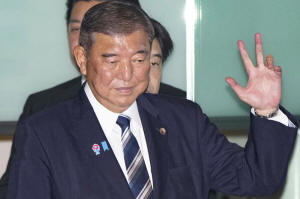Japan's prime minister resigns after his party suffered a historic
defeat in a summer election
[September 08, 2025]
By MARI YAMAGUCHI
TOKYO (AP) — Japan’s Prime Minister Shigeru Ishiba announced Sunday that
he will resign, following growing calls from within his party to take
responsibility for a historic defeat in July’s parliamentary election.
Ishiba, who took office in October, said he was stepping down as prime
minister and as the head of his conservative Liberal Democratic Party.
Ishiba, a 68-year-old centrist, had resisted demands from opponents
further to the right within his own party to resign. He argued that he
wanted to avoid a political vacuum at a time when Japan faces key
domestic and international challenges, including U.S. tariffs, rising
prices and growing tensions in the Asia-Pacific.
Ishiba explained at a news conference Sunday night that he had intended
for some time to take responsibility for his party's summer election
loss, but was first determined to make progress in tariff negotiations
with the United States. He described it as matter of the national
interest.
“Who would seriously negotiate with a government whose leader says he is
stepping down?" Ishiba said.
He said the moment had arrived with an order by U.S. President Donald
Trump on Friday to lower tariffs on Japanese cars and other products
from 25% to 15%.
“Having reached a milestone in the U.S. tariff negotiations, I decided
now is the time to make way for a successor," Ishiba said.
Pressure from the party
The resignation came one day before Ishiba's party was to decide whether
to hold an early leadership election, which would have amounted to a
virtual no-confidence motion against him if approved.

He said he made the “painful decision to resign” to avert that step
because “it would cause a critical division within the party, and that
is absolutely not my intention.”
Ishiba said he would instead start a process to hold a party leadership
vote to choose his replacement, which is expected to be held in October.
He is to remain as prime minister until a new leader is elected and
endorsed by the parliament.
Ishiba’s leadership that lasted only one year underscores the
instability of Japan’s minority government.
A maverick who won the leadership in his fifth attempts, Ishiba said he
regrets he could not live up to voters' expectations for change. “As a
result, I failed to go my own way, and I wonder how I could have done
better,” he said.
He said he is not going to run in the next leadership race, even though
he regrets leaving behind unfinished business, such as measures for
salary increases, agricultural reforms and further strengthening Japan's
security. He asked his future successor to tackle the issues he
cherished.
Loss after loss
In July, Ishiba’s ruling coalition failed to secure a majority in the
248-seat upper house in a crucial parliamentary election, weakening his
government. The loss followed a defeat in the more powerful lower house,
where the party-led coalition lost its majority in October, only two
weeks after Ishiba took over.
[to top of second column]
|

Japanese Prime Minister Shigeru Ishiba arrives at the prime
minister's office in Tokyo, Japan, Sunday, Sept. 7, 2025. (Kyodo
News via AP)

Liberal Democratic lawmakers who support the prime minister said those
who lost seats were largely ultra-conservatives who were linked to
corruption scandals before Ishiba took office. Public polling showed
that pressure on Ishiba to resign had the reverse effect and caused his
support to grow.
Calls for Ishiba to step down grew after the Liberal Democratic Party
last week called for a “complete overhaul” of the party following its
losses.
Taro Aso, a conservative heavyweight known for his anti-Ishiba stance,
and a minister and several deputy ministers in the Ishiba Cabinet
requested an early vote, prompting others to follow suit.
Former Health Minister Norihisa Tamura said on a talk show of the public
broadcaster NHK earlier Sunday that the best way to heal party divisions
and move forward is for Ishiba “to settle” the dispute before Monday’s
vote. The party has already been distracted from necessary work on
economic measures and on figuring out ways to gain opposition support in
the next parliamentary session, Tamura said.
Possible candidates to replace Ishiba include Agriculture Minister
Shinjiro Koizumi, as well as ultra-conservative former economic security
minister Sanae Takaichi and Chief Cabinet Secretary Yoshimasa Hayashi, a
moderate and the protege of former Prime Minister Fumio Kishida.
Lacking a majority in both houses, the next party leader will have to
work with the main opposition parties to get bills passed, experts say,
or else face constant risks of no-confidence motions.
The opposition parties, however, are too splintered to form a coalition
to topple the government.
Voters say they want to see the party move forward and get down to work
but they worry about uncertainty.
Office worker Takahiro Uchi welcomed Ishiba's resignation, as he hopes
for change, "but at the same time, there is also uncertainty and concern
about who will take over next.” Masataka Nishioka, who works for a
dental equipment company, said, “I really hope for a kind of politics
that makes life easier for everyone.”
___
AP video journalist Ayaka McGill in Tokyo contributed.
All contents © copyright 2025 Associated Press. All rights reserved
 |